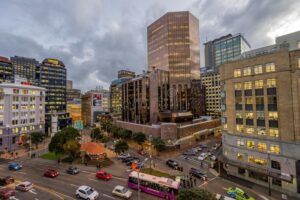And what does this mean for democracy in the 2023 elections?
Like a bolt out of the blue, Jacinda Ardern dropped a bomb shell by resigning as Prime Minister (all the signs were there, but I admit, I did not read the tea leaves very well). I had written this article before this news on the 19th January 2023. This article is not about Ardern, but about her government. It is fair to say that her reign as Prime Minister in the first three years was undoubtably successful, although the next three years became deeply problematic. Thus, while we settle into 2023 and the election year, it is time to reflect on what Jacinda Ardern and Labour delivered in 2022, and what they tried to do, and tried to take away from us as well.
Three Waters
Three Waters, which became Five Waters by the end of the year, had its first part put into legislation at the end of 2022. This was possibly one of the most divisive pieces of legislation before parliament last year, and probably ever. The need to review and make changes to how water supply and management in New Zealand is handled is not the concern here; everyone agrees changes are needed. The way this legislation is designed, is deeply controversial and divisive in many areas. From co-governance to Māori veto rights at certain levels; to deep conflicts of interest; to only Māori providing statements that are binding on all *(1); to the attempt by Nanina Mahuta and Eugene Sage to entrench part of this legislation, which was a clear breach of constitutional law, let alone deeply undemocratic.
Essentially Three Waters, once fully enacted, will deprive councils around New Zealand of effective control of their most valuable asset, handed over to unaccountable boards with 50% ownership to Māori in one form or another.
Note: we are already seeing this in South Africa, where vested interests and unelected members of South Africa’s electricity system with links to the ANC party are effectively crashing the system. Corruption and vested interests are denying obvious changes be made to correct the infrastructure problems.
Co-Governance
Labour has been on a determined path of co-governance throughout its last term of government (2020-2023), something they did not tell us about prior to the 2020 election. He Puapua was uncovered after the election. Ardern steadfastly denied its part of Labour policy, but we have seen many examples of co-governance in the past three years, most notably in 2022. Co-governance is deeply problematic, undemocratic in many guises and very debatable whether it truly reflects the Treaty of Waitangi.
Potentially, Labour is already co-governed, even though no-one has said so or explained it as such. I raise the question why Ardern did not sack Mahuta after her clear defiance of cabinet and caucus over the entrenchment clause in the Three Waters legislation? Is Mahuta too powerful to sack? Or is it because this government is already co-governed and Mahuta cannot be sacked? Ardern simply said Mahuta had not defied cabinet or caucus, defying the blatantly obvious.
No one knows what the true end game of co-governance is. Questions are rightly being asked what is going on here. Jim Bolger (with strong links to Māori) rightly asked Ardern to explain what co-governance means, and I would add, what affect will co-governance have on democracy as we know it today.
Breaches of Democracy
What we witnessed of co-governance in 2022 was attempts to overturn aspects of democracy. The most contentious issue was the Rotorua District Council (Representation Arrangements) Bill, that would have given Māori voters who represent 20% of the voters, 60% of the voting rights, a clear breach of democracy. Thankfully, the Attorney General, David Parker recognised this and snuffed out Tamaiti Coffey’s attempt to overturn democracy in Rotorua. If this legislation had passed, the chain reaction would have been devasting for democracy in the long term, not only for councils, but for voting rights for the government of New Zealand.
A form of anti-democracy was passed in parliament for the Canterbury Regional Council (Ngai Tahu Representation) Bill, where two unelected Māori can now sit on the council. Effectively, these two members come from the dominant Ngai Tahu iwi and cannot be voted off. They represent the vested interests of one iwi who have significant commercial clout. In Great Britain in the late 1700’s and early 1800’s, this was called rotten boroughs, liable to encourage corruption, personal influence, and privilege. This led to the Reform Act of 1832. The same may happen here, where members of councils (and Three Waters), who are not elected and cannot be removed, will be open to undemocratic behaviour. Potentially, the unintended consequences of changing our current democratic process.
Failure to adhere to human rights regarding MIQ
In its infinite wisdom, Labour implemented a cruel system of preventing New Zealanders from returning home as part of its Covid-19 response. At the beginning of the pandemic, the government said it was the right of all New Zealanders to be able to return home, without restrictions. Yet, by 2022 the government was effectively denying over 25,000 New Zealanders entry due to a cruel lottery system that did not work. Concurrently, special privileges were given to those with business interests, some given on very dubious grounds. While those with dying family members, or pregnant women, could not get back home and were denied entry. It eventually took a well-known journalist, Charlotte Bellis, and a few others to break this system and expose it for what it was. It was a cruel breach of our human rights, and it took successful court action brought by overseas New Zealanders to bring this system to its rightful end.
The New Health Authority
During the pandemic, the government set out to implement an ideological change to our health system and split it based on race. This will cost millions and take up to five years to implement. We now have one health authority for Māori, and one for the rest of us. Māori have potential veto rights over the whole system. This legislation is straight from the He Puapua playbook but was virtually unchallenged in its implementation. Yes, some changes were needed, but much of the argument for two health systems was based on systemic racism, white privilege, and unconscious bias in the health system. Yet no evidence of this was given, and nor has any case of racism been made through the courts *(2). In fact, seventy-seven “by Māori, for Māori” primary health providers have been available to Māori since 2000 *(3). Thus, a convenient lie was told that not only insulted all health workers but has resulted in two health systems based on race. Some have called this apartheid.
The result of this has been a crisis in the health system, with overworked doctors and nurses, and a system nearly unable to meet its core function of looking after the sick. In essence, it has been a disaster for our health system and for New Zealanders. It is not a good idea to get sick and be hospitalised.
Crime
During 2022 we saw an escalation of youth crime that resulted in over 500 ram raids *(4). The constant attack on dairies and liquor stores, jewellers and major malls has left their owners suffering injuries and even death, traumatized and feeling helpless. The government response to this crime wave was slow, haphazard at best and without caring for the victims. A sense of denial set in by the government, but eventually the minister responsible for police was replaced. Still, under the new minister, the response has been painfully slow. No effort has been made to address the underlying problems that drive this crime. If an effort is being made, it is not highly evident. Eventually, Waikato police have said enough is enough and are now armed so they can deal with the escalating level of violence and the increasing use of guns and knives. New Zealand, in some parts, is slipping in to a third world status.
The Cost-of-Living Crisis
Many New Zealanders are now suffering a cost-of-living crisis. For much of 2022 Labour denied such a crisis existed. Eventually, Labour admitted one did exist, but blamed world events, saying inflation was driven from offshore. While this is true, much of our inflation is internal. Both the government and the Reserve Bank have been blamed for the surge in inflation, that has effectively produced the cost-of-living crisis. Now many households struggle to meet basic requirements daily. Yet concurrently, many people have been spending like there is no tomorrow. In other words, the gap between the well-off and those suffering from this crisis has only widened. Again, the government was slow to respond, let alone accept such a crisis existed. Much the same as they have denied there is a labour crisis, where businesses are unable to find staff. Consequently, the economy suffers, and the cost-of-living crisis worsens. It will be a long time before we recover.
There is much more Jacinda Ardern and her government did and did not do in 2022 that made it potentially one of the worst governments of all time. The main points are the ones I have outlined above, and these are the issues voters need to be thinking about when they vote later this year. Not who the new Prime Minister is, or who is leading the opposition parties. This year is as much about the democratic rights of all New Zealanders than anything else. Labour through its actions in 2022, did not particularly care about the true value of democracy. They will attempt to play down their controversial, anti-democratic policies they subscribed to in 2022 in the lead up to the 2023 elections to deceive and manipulate voters into believing they do care. If they do get back into government (and form a coalition with the Greens, for example) at the end of the year, we will only see the hastening of their undemocratic reform programme over the next three years. By then, it will be too late to change the sad course New Zealand will be on. Therefore, your vote in 2023 is very important, especially for the sake of democracy.
*(1) (reference should be made to the detailed writings of Thomas Cranmer on these points)

